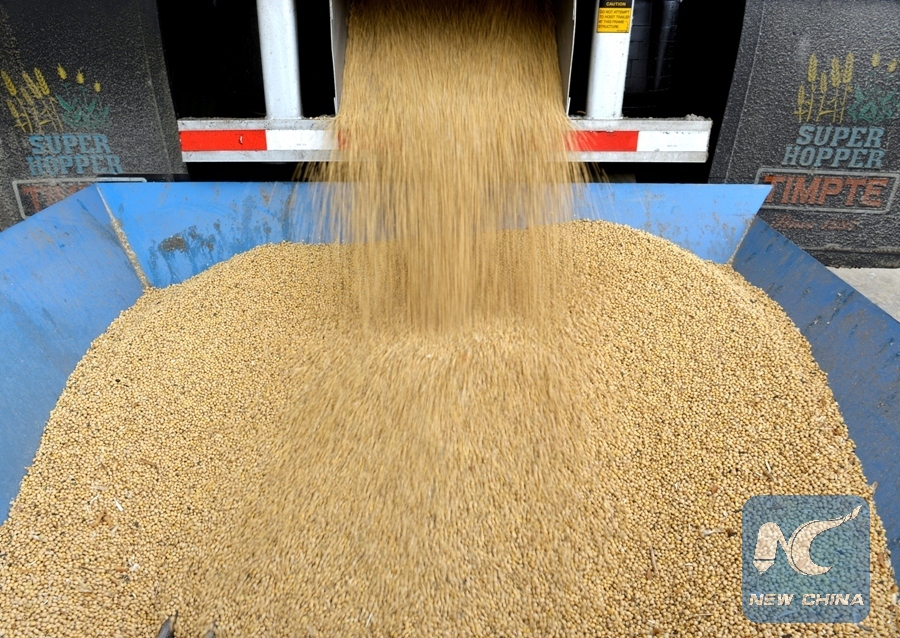
An incoming truckload of soybeans is unloaded at a farm in Fargo, North Dakota, U.S., Dec. 6, 2017. (Xinhua/REUTERS)
WASHINGTON, July 6 (Xinhua) -- As Washington's ill-advised tariffs against China took effect early Friday, U.S. businesses and farmers joined the chorus to decry the provocative policy which they feared would backfire on the U.S. economy.
The Chinese response, announced by the Chinese Ministry of Commerce following Washington's decision, is set to impact a slew of U.S. agricultural products and industries, ranging from soybeans to seafood.
The potential retaliation has sent jitters to U.S. businesses, prompting many to urge policymakers to roll back the detrimental measures.
For many soybean farmers in the U.S. Midwest who are likely to bear the brunt of retaliatory tariffs, the decisions made by the White House can make the difference from prosperity or bankruptcy.
Hundreds are appealing to the administration on social media with the hashtag #facesoftariffs, reminding politicians that livelihoods stand to lose should trade tensions between the world's largest and second largest economies escalate.
China is the top export market for U.S. soybeans, accounting for almost 14 billion U.S. dollars in sales, representing roughly a third of total U.S. soybean production in 2017.
American Soybean Association President John Heisdorffer, a soybean producer from Keota, Iowa, emphasized the importance of the Chinese market and the investment U.S. farmers have devoted to cultivate the Chinese market.
"It is imperative that we maintain the robust market we have worked so hard for decades to establish with China. China is our top market, importing 31 percent of our crop last year. They have a sizeable feed industry that's dependent on soybeans, the largest swine herd in the world, the largest global aquaculture industry, and are rapidly modernizing their poultry, egg, dairy, and beef industries," he said.
"They are a vital trading partner, and we need to continue to do business with China without the sting of these tariffs," he said.
U.S. car manufacture giant General Motors (GM) is also eyeing a loss in the face of the trade wars Washington is waging.
The company's executives issued an urgent plea for U.S. lawmakers last week to apply the breaks for the tariffs.
"Increased import tariffs could lead to a smaller GM, a reduced presence at home and abroad for this iconic American company, and risk less-not more-U.S. jobs," the plea warned.
According to the statement, much of GM's efficiency and competitiveness comes from globalization, and losing its edge against its competitors can put many of its 110,000 U.S. jobs in jeopardy.
Not just corporate giants are bracing for steep sales loss, smaller family owned businesses who are caught in the crossfire are also spooked.
In Lexington in the state of Kentucky, Amir Peay operates a small distillery.
Before all the talk of tariffs, his sales were steadily rising, building on the gradual acceptance of the signature U.S. liquor in European and Asian markets.
Now, the tariffs come as "a punch to the gut," he told local media in a recent interview.
While larger distilleries who are better financed and have the hope of riding out the storm, smaller business are especially vulnerable in any disruptive trade environment.
Peay said his company had invested heavily in expanding overseas markets in the past few years in hopes of growing his business into a virtuous cycle, but the tariffs have put that in harsh perspective.
Some lawmakers who come from districts that may suffer from the trade tensions are voicing their concern to the White House, which largely has the control over the steering wheel on trade policies, saying the administration has to take into consideration of U.S. citizens who can potentially become cannon fodder if the trade war escalates.
"Mr. President, these tariffs have real consequences on states like Iowa, rural communities across the nation and on America's farms. We encourage you to act expeditiously to save our rural economies," a group of House representatives said in a letter issued on June 25.
Groups representing other industries are also speaking up.
The National Retail Federation on June 18 issued a statement saying a tit-for-tat trade war "has erupted and American families are caught in the middle. Higher prices for everyday essentials and lost jobs threaten to sap the energy out of the strong U.S. economy just as most Americans are starting to enjoy the benefits of historic tax reform. This reckless escalation is the latest reminder that Congress must step in and exert its authority on trade policy."
According to the group, if the U.S. government fully implements its threatened tariffs, U.S. gross domestic product (GDP) may decline by nearly 3 billion dollars and lead to the loss of 134,000 American jobs. Imposing tariffs on an additional 100 billion dollar of Chinese imports would cause a 49-billion-dollar reduction in GDP and a loss of 455,000 jobs.
But the earnest requests seem to be lost on administration officials, who are willfully ignoring the chorus of pleas from Americans of all walks of life.

